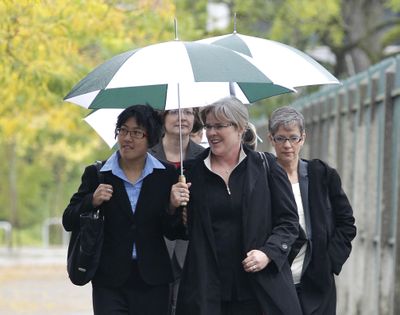Witt: They asked, I never told
Former major recounts dismissal

TACOMA — Margaret Witt, a decorated Air Force nurse from Spokane, said she was “absolutely shocked” when a military lawyer said she was under investigation for homosexual conduct.
Taking the stand in U.S. District Court where she is contesting her 2004 discharge under the military’s “Don’t ask, Don’t tell” policy, Witt said she was asked by a member of the judge advocate general staff about her female roommate.
“I was absolutely shocked I was asked anything at all,” said Witt, a Spokane resident who sometimes fought back tears on the stand. “I had spent years not saying anything.” She didn’t acknowledge she was gay during that investigation.
Asked what her understanding of the military’s policy was, Witt said she believed “they couldn’t ask and I wasn’t supposed to tell.” Witt said she was in a relationship with the woman from 1997 through 2003.
She was suspended from her Air Force Reserve unit, the 446th Air Evacuation Squadron at McChord Air Force Base, where she had served as a decorated flight nurse and held a series of management positions. She appealed, but didn’t get a hearing for almost two years. After that hearing she was given an honorable discharge; she’s suing to be reinstated.
After she and her long-time partner separated in the fall of 2003, Witt said she began a relationship with a married co-worker at her civilian job with Spokane Public Schools. She acknowledged that the woman, Laurie McChesney, had not yet separated from her husband, although the couple eventually divorced and Witt and McChesney now live together in Spokane.
“Although I don’t regret our relationship…I do very much regret the way I handled it in the beginning and apologize for that.”
One of the ways the military discovered Witt was a homosexual was because McChesney’s husband Pat wrote a letter of complaint to one of her senior officers.
Under cross-examination by federal attorney Peter Phipps, Witt acknowledged that a military officer is expected to lead by example and have high integrity.
“And you understand that adultery is not consistent with a high standard of integrity?” Phipps asked.
“Yes,” Witt replied.
She said that she never told any member of her Air Force Reserve unit that she was a lesbian, although some may have reached that conclusion based on their comments and she did not contradict it.
When she entered the Air Force in 1987, she didn’t consider herself a lesbian, Witt said. “I didn’t label myself anything,” and she dated men as well as women through the early 1990s. When the military established the “Don’t Ask Don’t Tell” policy in 1993, she did consider herself a lesbian, although she said it isn’t her favorite term.
“It sounds like alien to me,” she said.
Witt had long-term relationships with two female officers during her career. One was prior to the establishment of the Don’t Ask, Don’t Tell policy, and the second was after it. Neither woman was in her chain of command, she said
She didn’t tell her parents the reason for her suspension in 2004, and didn’t tell them she was homosexual until 2006, on the eve of the press conference announcing her lawsuit. “I figured they should hear it from me instead of seeing it on the news. They didn’t miss a beat. They’ve been behind me the whole time. That’s been the best thing to come out of this.”
Witt said told U.S. District Judge Ronald Leighton that by being involuntarily discharged after 18 years in the military, she lost her pension and other benefits that are eligible to people who serve 20 or more years. “It’s like I was never there,” she said.
She currently works at the Veterans Affairs Medical Center in Spokane as a way of serving her country, but would like to return to the military.
“I have skills and I haven’t been able to use them,” she said. “It kills me not to be there.”
Late in the afternoon, Elizabeth Kier, an associate professor of political science at the University of Washington who has studied military policy, said there’s no basis for the theory that having homosexuals in the ranks is a problem for a unit’s ability to do its work: “There’s over 50 years of research…that comes down to the same conclusion.”